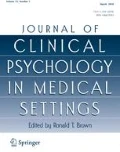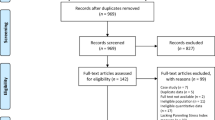Abstract
This paper describes the initial development of the Disruptive Behavior Stress Inventory (DBSI). This 40-item measure, which provides indices of the number of stressors experienced during the past 6 months and the rated stressfulness of these events, is designed to assess behavior-related family stress experienced by families of children with attention-deficit/hyperactivity disorder (ADHD). Findings provide strong support for the internal consistency of the DBSI and suggest adequate test-retest reliability. Support for the validity of the measure is suggested by findings that DBSI stress indices differentiate between parents of children with ADHD and those with no history of this disorder. Additional support is provided by findings that scores on the DBSI also differentiate between parents of children with ADHD, combined type and parents of children with ADHD, inattentive type. It is suggested that this measure may provide useful clinical information regarding stress levels in families of children with ADHD and that it may be of potential value as an ADHD treatment outcome measure.
Similar content being viewed by others
REFERENCES
Abidin, R. R. (1995). Parenting Stress Index: Professional manual (3rd ed.). Odessa, FL: Psychological Assessment Resources.
American Academy of Pediatrics. (2000). Diagnosis and evaluation of the child with attention-deficit/hyperactivity disorder. Pediatrics, 105(5), 1158–1170.
American Psychiatric Association. (1994). Diagnostic and statistical manual of mental disorders (4th ed.).Washington, DC: Author.
Anastopoulos, A.D., Guevremont, D.C., Shelton, T. L., & DuPaul, G. J. (1992). Parenting stress among families of children with attention deficit hyperactivity disorder. Journal of Abnormal Child Psychology, 20, 503–520.
Baker, B. L., & Heller, T. L. (1996). Preschool children with externalizing behaviors: Experience of fathers and mothers. Journal of Abnormal Child Psychology, 24, 513–532.
Barkley, R. A. (1998). Attention deficit hyperactivity disorder: A handbook for diagnosis and treatment (2nd ed.). New York: Guilford.
Barkley, R. A., & Cunningham, C. E. (1979). The effects of methylphenidate on the mother–child interactions of hyperactive children. Archives of General Psychiatry, 36, 201–208.
Barkley, R. A., Karlsson, J., Pollard, S., & Murphy, J. V. (1985). Developmental changes in the mother–child intearctions of hyperactive boys: Effects of two dose levels of Ritalin. Journal of Child Psychology and Psychiatry, 26, 705–715.
Befera, M.S., & Barkley, R.A. (1985). Hyperactive and normal girls and boys: Mother–child interaction, parent psychiatric status and child psychopathology. Journal of Child Psychology and Psychiatry, 26, 439–532. 62 Johnson and Reader
Breen, M. J., & Barkley, R. A. (1988). Child psychopathology and parenting stress in girls and boys having attention deficit disorder with hyperactivity. Journal of Pediatric Psychology, 13, 265–280.
Brown, R. T., & Pacini, J. N. (1989). Perceived family functioning, marital status, and depression in parents of boys with attention deficit disorder. Journal of Learning Disabilities, 22, 581–587.
Cantwell, D. P. (1996). Attention deficit disorder: A review of the past 10 years. Journal of the American Academy of Child and Adolescent Psychiatry, 35, 978–987.
Crnic, K. A., & Acevedo, M. (1995). Everyday stresses and parenting. In M. H. Bornstein (Ed.), Handbook of parenting: Vol. 4. Applied and practical parenting (pp. 277–297). Nahwah, NJ: Erlbaum.
Crnic, K. A., & Greenberg, M. T. (1990). Minor parenting stresses with young children. Child Development, 61, 1628–1637.
Cunningham, C. E., & Barkley, R. A. (1979). The interactions of normal and hyperactive children with their mothers in free play and structured tasks. Child Development, 50, 217–224.
Cunningham, C. E., Benness, B. B., & Siegel, L. S. (1988). Family functioning, time allocation, and parental depression in the families of normal and ADDH children. Journal of Clinical Child Psychology, 17, 169–177.
Donenberg, G., & Baker, B. L. (1993). The impact of young children with externalizing behaviors on their families. Journal of Abnormal Child Psychology, 21, 179–198.
Dumas, J. E. (1986). Indirect influence of maternal social contacts on mother–child interactions: Asetting event analysis. Journal of Abnormal Child Psychology, 14, 205–216.
Fischer, M. (1990). Parenting stress and the child with attention deficit hyperactivity disorder. Journal of Clinical Child Psychology, 19, 337–446.
Gillberg, C., Carlstrom, G., & Rasmussen, P. (1983). Hyperkinetic disorders in seven-year old children with perceptual, motor, and attentional deficits. Journal of Child Psychology and Psychiatry, 24, 233–246.
Humphries, T., Kinsbourne, M., & Swanson, J. (1978). Stimulant effects on cooperation and social interaction between hyperactive children and their mothers. Journal of Child Psychology and Psychiatry, 19, 13–22.
Jensen, P. S., Martin, D., & Cantwell, D. P. (1997). Comorbidity in ADHD: Implications for research, practice, and DSM-V. Journal of the American Academy of Child and Adolescent Psychiatry, 36, 1065–1079.
Johnson, J. H. (1986). Life events as stressors in childhood and adolescence. Newbury Park, CA: Sage.
Johnston, C. (1996). Parent characteristics and parent–child interactions in families of nonproblem children and ADHD children with higher and lower levels of oppositional defiant behavior. Journal of Abnormal Child Psychology, 24, 85–104.
Mash, E. J., & Johnston, C. (1983a). Parental perceptions of child behavior problems, parenting self-esteem, and mothers' reported stress in younger and older hyperactive and normal children. Journal of Consulting and Clinical Psychology, 51, 86–99.
Mash, E. J., & Johnston, C. (1983b). Sibling interactions of hyperactive and normal children and their relationships to reports of maternal stress and self-esteem. Journal of Clinical Child Psychology, 12, 91–99.
Mash, E. J., & Johnston, C. (1990). Determinants of parenting stress: Illustrations from families of hyperactive children and families of physically abused children. Journal of Clinical Child Psychology, 19, 313–328.
Patterson, G. R. (1983). Stress: A change agent for family process. In N. Garmezy & M. Rutter (Eds.), Stress, coping, and development in children (pp. 235–264). New York: McGraw-Hill.
Pelham, W.E., & Lang, A. R. (1999). Can your children drive you to drink? Stress and parenting in adults interacting with children with ADHD. Alcohol Research and Health, 23, 292–298.
Sarason, I. G., Johnson, J. H., & Siegel, J. M. (1978). Assessing the impact of life changes: Development of the Life Experiences Survey. Journal of Consulting and Clinical Psychology, 46, 932–946.
Sheeber, L. B., & Johnson, J. H. (1992). Child temperament, maternal adjustment and changes in family life style. American Journal of Orthopsychiatry, 62, 178–185.
Tallmadge, J., & Barkley, R. A. (1983). The interactions of hyperactive and normal boys with their fathers and mothers. Journal of Abnormal Child Psychology, 11, 565–580.
Webster-Stratton, C. (1990). Stress: A potential disruptor of parent perceptions and family interactions. Journal of Clinical Child Psychology, 19, 302–312.
Author information
Authors and Affiliations
Rights and permissions
About this article
Cite this article
Johnson, J.H., Reader, S.K. Assessing Stress in Families of Children with ADHD: Preliminary Development of the Disruptive Behavior Stress Inventory (DBSI). Journal of Clinical Psychology in Medical Settings 9, 51–62 (2002). https://doi.org/10.1023/A:1014136029697
Issue Date:
DOI: https://doi.org/10.1023/A:1014136029697




